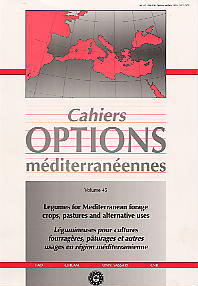| Article précédent | p. 343-347 | Article suivant |
Germination pattern of certain annual legumes in a sub-humid Mediterranean environment of Macedonia, Greece
Fresh seeds of certain annual legumes such as Trifolium scabrum, T. campestre, T. angustifolium, Medicago minima, M. disciformis, Onobrychis aequindentata and O. caput-galli were collected every month from July to November as well as in March and April of the growing period 1997-1998. The seeds were induced to germination and the germination percentages were recorded. The results showed that all species, except Onobrychis aequindentata, did not germinate during summer. Germination percentages were low in the autumn and peaked in different month for each species, possibly owing to different autumn temperatures; spring germination was very low or non-existent. The effect of precipitation was possibly critical for the release of hardseededness, but new research is needed to verify its role.
- [ Afficher ]
- [ Télécharger ]
- [ Exporter la citation ]
Vous pouvez télécharger la citation au format :
- [ Imprimer ]
-
Mots-clés
BANQUE DE GENES, GERMINATION, GRECE, LEGUMINEUSE FOURRAGERE, PATURAGES, PLANTE ANNUELLECiter cet article
Merou T., Papanastasis V.P. Germination pattern of certain annual legumes in a sub-humid Mediterranean environment of Macedonia, Greece. In : Sulas L. (ed.). Legumes for Mediterranean forage crops, pastures and alternative uses . Zaragoza : CIHEAM, 2000. p. 343-347. (Cahiers Options Méditerranéennes; n. 45). 10. Meeting of the Mediterranean Sub-Network of the FAO-CIHEAM Inter-Regional Cooperative Research and Development Network on Pastures and Fodder Crops, 2000/04/04-09, Sassari (Italy). http://om.ciheam.org/om/pdf/c45/00600221.pdf



